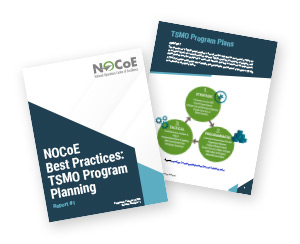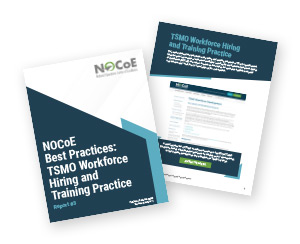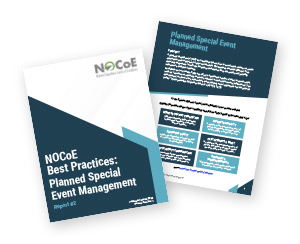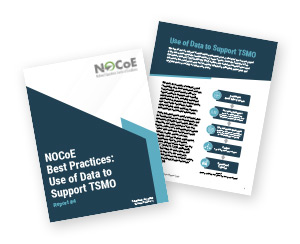Best Practice Reports
NOCoE Best Practice reports collect use cases and implemented strategies that have benefited a TSMO agency or the traveling public they serve. These reports are developed with the assistance of the Transportation Operations Manual (TOM) and synthesize practices already published by NOCoE, FHWA, AASHTO and other partners in capturing the benefits of TSMO.
Additional practices can be found among the 200+ case studies in our case study library.

TSMO Program Planning (Feb 2025)
The Transportation Operations Manual identifies five functions of a TSMO program plan:
- Articulating the business case for TSMO; its role within the agency’s mission, goals, and objectives; and its relationships with other agency programs and processes.
- Highlighting the value of TSMO in responding to specific customer service needs and deficiencies, new technology and business models, and opportunities for collaboration.
- Specifying the TSMO-specific technical processes required to engineer TSMO systems, and the planning and project development processes to implement them
- Addressing the critical roles, responsibilities, and capabilities needed to support continuous improvement of an effective TSMO program
- Identifying essential resource needs, including financial, staffing, and performance measurement resources.

TSMO Workforce Development: Hiring and Training (March 2025)
This report shares best practices in the hiring and training practices of TSMO organizations. With the growing number of resources available, including by the National Operations Center of Excellence (NOCoE), this report focuses on four topics for agencies seeking to expand and improve their workforce’s knowledge, skills, and abilities.
A starting point all TSMO workforce resources is the NOCoE TSMO Workforce Portal: https://transportationops.org/workforce which includes guidance on training, career development, model position descriptions and a database of TSMO trainings.

Planned Special Event Management (April 2025)
A planned special event (PSE) is an incident known prior to occurrence, which can cause congestion and unexpected delays for travelers. The impacts are often different than recurring congestion in both the frequency and impact from the events and possibly reduction in available roadway.
In addition to event traffic, PSEs can affect a significant number of other roadway users, such as “travelers on adjoining roadways, regional or multistate teams, public transit, law enforcement, medical or fire responders, event parking, event organizers and the general public.” (Transportation Operations Manual, AASHTO, 2023)

NOCoE Best Practices: Use of Data to Support TSMO (July 2025)
The use of data to support transportation operations has evolved but has always played a key role in managing the transportation system. Big data, the concept of collecting and integrating data from numerous sources, has provided practitioners with new opportunities to manage and visualize transportation data, enabling increased capabilities in performance management, real-time traffic operations, traffic signal retiming, ramp metering, incident management, and traveler information.